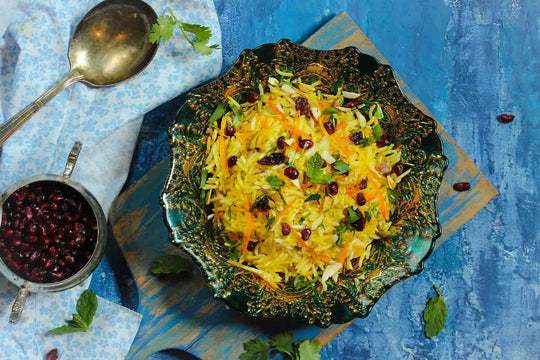
Saffron
Description
Saffron is a highly-prized spice. It is also known as ‘vegetable gold’ or ‘red gold’, though it is more expensive than the precious metal! Spain and the Middle East produce the most saffron, with Middle East growing 90% of all saffron used in the world. It is also grown in some areas of Greece and India. There are even people trying to revive saffron production here in the UK – including in the historical centre of British saffron farming, Saffron Walden in Essex.
Depending on where you are in the world, you may see saffron referred to as zafran or zaffran, kong, kesram, kesar, or jafranekar.
What is saffron?
Saffron is the stigmas from purple crocus flowers. Each crocus produces only three stigmas, and these must be hand harvested to make sure the delicate strands stay intact. It is this labour-intensive process that dictates much of the price of saffron. That, and the fact that it takes around 150 crocuses to produce a single gram of saffron. The stigmas are then air-dried in the dark and lightly fermented to make them ready to use as a spice.
Saffron threads are a deep, vibrant red-orange colour. Beyond that, they look somewhat unassuming. But saffron is one of the most complex spices out there – and it sometimes seems as though no two people can ever completely agree on what it smells and tastes like.
Saffron should have a honeyed, almost floral smell. However, you may also notice hay-like aromas, or even more mineral notes as of the sea. Some people perceive saffron as a bitter taste, some pick up on more grassy flavours, and still others will experience honey tones. There are also those who liken saffron to tobacco, or identify notes of cedar, citrus, pepper and even menthol!
If you have grown up with saffron you are more likely to notice sweeter flavours. If your first experience of saffron is as an adult use it very sparingly indeed, or you may find your first taste too bitter. You will become accustomed to it, so keep experimenting!
How do I cook with saffron?
With saffron a little goes a very long way. A single small pinch is enough to impart deep, golden yellow colours and distinctively dusky, honey-hay flavours to whole dishes.
This high-quality saffron is typically used in Middle Eastern, Indian and Spanish cuisines. It adds colour and flavour to a multitude of sweet & savoury dishes. For best results, briefly toast a small pinch of saffron in a dry pan. Then steep the strands in warm water, stock or even milk for around 30 minutes. This will release the saffron’s essential oils for better flavour and fragrance, a bit like infusing tea. Add the saffron liquid to your dish towards the end of cooking if it’s a curry, soup, tagine or rice dish. With cakes and breads, use at the usual point in the recipe when wet ingredients are added.
Saffron rice is a vibrant and fragrant accompaniment to any curry. Then, of course, there’s paella – the eye-catching Spanish rice dish that’s famed for its golden hue. The Italians have also embraced saffron by using it with chicken stock, butter and egg yolk in a rich, velvety risotto.
In France, saffron is a key spice in bouillabaisse – a traditional Provençal fish stew. It’s also popularly used to put an exotic, fragrant twist on a classic mussels mariniere. Look to French cuisine to discover how to perfectly pair saffron with fish & shellfish.
Sweden, Norway and – perhaps unexpectedly – Cornwall all have variations on saffron bread or buns. The finished bread is sunshine yellow, with the exotic fragrances of saffron, cinnamon and nutmeg.
In India, saffron milk – or kesar doodh – is a classic drink in the summer. It’s very sweet, but the mixture of saffron and cardamom makes it wonderfully fragrant. Here at Sous Chef, we adapted this traditional Indian drink into a bubble tea recipe! Saffron can even be used in a similar way to vanilla in custards and cakes, just remember to be sparing.
Brand may vary depending on availability
-
Best before: 30 August 26
-
SKU: SK0020A
-
Minimum shelf life: 1 month
-
Categories:
Cyrus Todiwala's Top Picks Dina Begum's Top Picks Foodservice Greek Food & Ingredients Herbs & Spices Maria Bradford's Top Picks Middle Eastern Food & Ingredients Middle Eastern Herbs & Spices Sabrina Ghayour's Top Picks Saffron Spanish Food & Ingredients Spices & Spice Mixes
Product Highlights
- Honeyed, almost floral scent
- Some find it sweet and some find it bitter
- Popular in Middle Eastern and Spanish cooking
- A single small pinch is enough for an entire dish
- For max flavour, toast, then infuse in liquid for 30 minutes
Delivery
| Delivery Option | Price |
|---|---|
| EVRi ? | £4.50 or FREE for orders over £60 |
| DPD Express ? | £7 or FREE for orders over £100 |
| DPD Signature Required ? | £7 or FREE for orders over £60 |
| DPD Saturday or Sunday ? | £9 or FREE for orders over £150 |
Disclaimer
These summary details have been prepared for information purposes only, and are designed to enhance your shopping experience on the Sous Chef website. While we have taken care in preparing this summary and believe it is accurate, it is not a substitute for your reading the product packaging and label prior to use. You should note that products and their ingredients are subject to change.



























